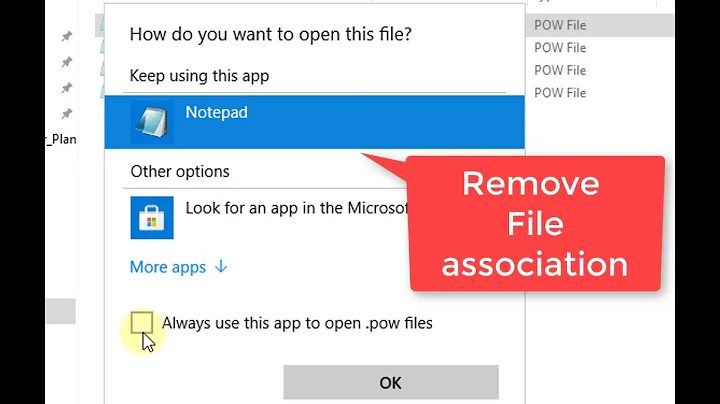How can I delete files containing a number '3' or '2' in their filename?
Solution 1
For the current directory, you can use:
rm -- *[23]*
If you want to restrict it, to match only files where the 2 or 3 must occur between K and .wav:
rm K*[23]*.wav
If you want to make this safer by forcing rm to ask for confirmation for every file, use the -i interactive flag:
rm -i K*[23]*.wav
###Notes
- the shell glob
*matches any number (including zero) of any characters - to the shell
[some chars]is a character class - anything inside can match -
--is recognised byrmas the end of options. This avoids errors if any filenames begin with-; otherwise the filename may be interpreted as an option
If you need to avoid matching 22, 23, 32, 33, you'll need something a little more complex, like αғsнιη's answer.
Solution 2
You can use shell globs:
rm *2* *3*
That will delete all files (not directories) inside the current working directory which get matched by either of the *2* or *3* globs.
In those globs, "* always means "any number (including zero) of any character".
Note however that IIRC Bash's globs don't match hidden files (filename starting with a .) by default.
Solution 3
For the current directory or any other location:
-
Run this to see what is to be deleted:
find . -type f -iname "*[32]*.wav" -
Then delete with:
find . -type f -iname "*[32]*.wav" -delete
More information:
-
.means current directory, could also be path to location of file, like/path/to/files - To prevent
findfrom moving into any directory in the intended target use the option-maxdepth 1, hence:find . -maxdepth 1 -type f -iname "*[32]*.wav" -delete
- If in the target directory then use:
find . -maxdepth 1 -type f -iname "*[32]*.wav" -delete
CAUTION
Never do this find . -delete -type f -iname "*[32]*.wav" else all (your files) will be deleted!
Solution 4
While the given answers also delete files including *23*, *32*, *2*3*, *3*2*, *2* or *3* files patterns + this answer with rm *2* *3* solution will try to delete a file K-0_0_0_0_3_0_1_2.wav two times and second try will failed as it's deleted by *2* matched pattern!.
To avoid these, below is a command which only returns files including 2 or 3 or both in their names only repeated once.
find . -type f -name "*[^0-9][2|3][^0-9]*" #-delete
Or in rm you could use the following instead.
rm -- *[^0-9][23][^0-9]*
Related videos on Youtube
I am not Fat
Updated on September 18, 2022Comments
-
I am not Fat over 1 year
I am currently trying to delete some files. The files I want to delete contain the number 3 or 2, either both or one of them.
How do I delete files containing those numbers?
The files are named like so:
K-0_0_1_1_1_1_1_0.wav K-0_0_1_1_1_1_1_1.wav K-0_1_0_0_0_0_0_0.wav K-0_1_0_0_0_0_0_1.wav K-0_1_0_0_0_0_1_0.wav K-0_0_0_0_0_0_0_2.wav K-0_0_0_0_0_0_0_3.wav K-0_0_0_0_0_0_1_2.wavIn this list the last three files should be deleted.
-
 Byte Commander almost 7 yearsIndeed, that character list is even more elegant than two globs :-)
Byte Commander almost 7 yearsIndeed, that character list is even more elegant than two globs :-) -
 Zanna almost 7 years@ByteCommander thanks :) but maybe easier to mess up haha. And you demonstrate that
Zanna almost 7 years@ByteCommander thanks :) but maybe easier to mess up haha. And you demonstrate thatrmtakes multiple arguments -
 David Foerster almost 7 yearsWhy not simply
David Foerster almost 7 yearsWhy not simply-deleteinstead of-exec rm {} \;? No need to invokermfor every single matched file. -
Eliah Kagan almost 7 yearsIf for whatever reason one does call
rmfromfind, it's best to userm --so the filename argument(s) won't be interpreted as options. Otherwise someone can name a file something like-rand cause trouble...find's-deleteaction is almost always the best approach, though. -
Eliah Kagan almost 7 yearsWell, if
rmdidn't accept multiple filenames, neither way would work when the shell expands the glob to more than one filename. The main differences betweenrm -- *[23]*andrm -- *2* *3*are (a) that*2* *3*can give the same filename twice and (b) the order. With the OP's files,echo *[23]*showsK-0_0_0_0_0_0_0_2.wav K-0_0_0_0_0_0_0_3.wav K-0_0_0_0_0_0_1_2.wavwhileecho *2* *3*showsK-0_0_0_0_0_0_0_2.wav K-0_0_0_0_0_0_1_2.wav K-0_0_0_0_0_0_0_3.wav. Withrmthis affects deletion order and thus the order errors (or messages due to-v,-i, or-I) are shown. -
 Zanna almost 7 years@EliahKagan oh yes of course to the first part :) I didn't realise that it would affect the order of the output though
Zanna almost 7 years@EliahKagan oh yes of course to the first part :) I didn't realise that it would affect the order of the output though -
Jérôme almost 7 years+1 for using find. Use it in two steps, first step without -delete, so that you see what you're going to delete next. Also, watch out, if you move -delete before the -type and -iname selectors, you're deleting everything.
-
 Zanna almost 7 years
Zanna almost 7 yearsxargsdies horribly if there are spaces in filenames though... -
 wjandrea almost 7 yearsI think
wjandrea almost 7 yearsI thinkrm *{2,3}*is equivalent -
 Loreto Gabawa Jr. almost 7 yearsSimple fix for xargs, use find . -type f -name file-pattern -print0 | xargs -0 rm -v. Spaces in files are not a problem for args if you use the -0 to change the deliminator to the null character. If you want a different one, use -d 'char' where char is the delimiter that you want to use. I usually use -exec instead of piping to xargs on find commands myself.
Loreto Gabawa Jr. almost 7 yearsSimple fix for xargs, use find . -type f -name file-pattern -print0 | xargs -0 rm -v. Spaces in files are not a problem for args if you use the -0 to change the deliminator to the null character. If you want a different one, use -d 'char' where char is the delimiter that you want to use. I usually use -exec instead of piping to xargs on find commands myself. -
 αғsнιη almost 7 yearsthis
αғsнιη almost 7 yearsthisrm *2* *3*is deleting a fileK-0_0_0_0_3_0_1_2.wavtwo times as example and second try will failed as it's deleted before with matched pattern*2*in rm -
 αғsнιη almost 7 yearsThis is deleting files also including
αғsнιη almost 7 yearsThis is deleting files also including*23*or*32*files. -
 George Udosen almost 7 yearsPlease explain don't get you @AFSHIN
George Udosen almost 7 yearsPlease explain don't get you @AFSHIN -
 αғsнιη almost 7 yearsfor example that will delete file
αғsнιη almost 7 yearsfor example that will delete fileK-0_0_0_0_0_0_1_32.wavorK-0_0_0_23_0_0_1_0.wav, see my answer below -
 αғsнιη almost 7 years+ this will delete files with matching
αғsнιη almost 7 years+ this will delete files with matching*2*3*or*3*2*, likefile_22222.wavorfile_333333.wavorfile_23.wav, ... like other giving answers, please check my answer also -
 αғsнιη almost 7 yearsThis is true for your answer also.
αғsнιη almost 7 yearsThis is true for your answer also. -
 αғsнιη almost 7 yearsI'm in bash 4.3
αғsнιη almost 7 yearsI'm in bash 4.3 -
 Zanna almost 7 yearssorry it was my bad, my filenames were too diverse - it works on OP's files. But TIL we can use
Zanna almost 7 yearssorry it was my bad, my filenames were too diverse - it works on OP's files. But TIL we can use[^.]negation in the shell!



![[Fix] Source Path Too Long while deleting files](https://i.ytimg.com/vi/nWrHjbSvOTE/hq720.jpg?sqp=-oaymwEcCNAFEJQDSFXyq4qpAw4IARUAAIhCGAFwAcABBg==&rs=AOn4CLDpA6NqEHCdprt_B-rNHr90GaXxDA)
